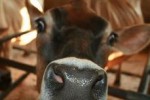Vermont’s dying farms

Trish Young set up her video camera to film the milking parlor at a local dairy. But it got dirty in hurry and she had to move it. And move it again. And move it again.”Cows were going to bathroom all around me!” Young said wrinkling her nose as she recalls her experience. “It got on my sweats. The workers were dressed for it, I was not.”
Young may have been unprepared, but she was able to see firsthand the working conditions at an operating dairy farm.
“They work at 4:30 or 5:00 in the morning. I got to see what they do, it was gross, though.”
Young is just one of the 15 students in the Documentary Workshop course, which is in the process of producing a 28 to 40 minute documentary about the dairy farming industry in Vermont.
Each semester the course is offered, the class chooses a topic to investigate, according to Robert Gershon the class’s professor.
“We pitched ideas and dairy farming came up,” Gershon said. “It seemed to resonate with everybody. Everybody knew people whose farms had gone away.”
For Lydia Jenks, a senior, the project is personal.
“I’ve seen family friends go out of business.” Jenks said. “We used to go to their farms and dip cups into milk pales and pull out a glass of milk. Now you have to push cobwebs aside to get into the barns.”
According to Matt Birjas, a senior in the class, the state lost 32 dairy farms in the past year, four in August alone.
“When I found out about the situation, it was startling,” Birjas said. “We wanted to prevent it.”
Jenks said she thinks people aren’t as upset as they should be and it’s because the issue has not been brought to their attention in the right way.
“Our goal is to get more people looking at the issue, helping the farmer, and not losing what I romanticize Vermont to be,” Jenks said.
The family farm is going out of business in Vermont.
“When my friends from Boston come up, they always joke ‘there’s more cows then people in Vermont.’ But there aren’t that many cows. There aren’t that many farms,” she said.
The documentary looks to show the state of the dairy farm in Vermont from as many angles and different sides of the issue as possible, Jenks said.
The class has interviewed the Vermont Commissioner of Agriculture, the senior analyst of the Department of Agriculture, the manger of Cabot factory, local farmers and politicians involved in policy.
“We are trying to have a good mix of business people and farmers,” Caitlin Lawler, a junior said. “And we’ve got a lot of cows. Lot’s and lot’s of cows.”
The documentary has been in production since classes began this semester. The class is finishing up shooting this week and will begin editing after Thanksgiving. It will premier during exam week on Dec. 21 at 10:30 a.m. in Herrick Auditorium.
From there, the Vermont Secretary of Agriculture asked to show it at State house.
The importance of the material and the potential impact of the film have given the class motivation to do their best.
“In school you do things because it’s an assignment. And class projects are hard, there’s always someone who doesn’t do their part,” Jenks said. “But in this, everyone is behind it. Everyone has a piece of their heart in it. We want a good product that will make an impression.




